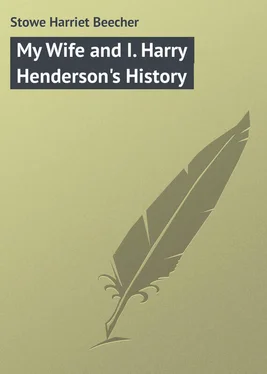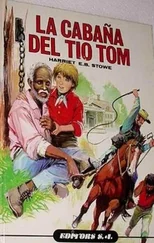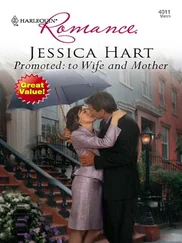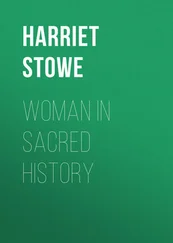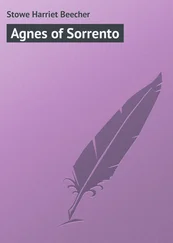Harriet Stowe - My Wife and I. Harry Henderson's History
Здесь есть возможность читать онлайн «Harriet Stowe - My Wife and I. Harry Henderson's History» — ознакомительный отрывок электронной книги совершенно бесплатно, а после прочтения отрывка купить полную версию. В некоторых случаях можно слушать аудио, скачать через торрент в формате fb2 и присутствует краткое содержание. ISBN: , Издательство: Иностранный паблик, Жанр: foreign_prose, foreign_language, на английском языке. Описание произведения, (предисловие) а так же отзывы посетителей доступны на портале библиотеки ЛибКат.
- Название:My Wife and I. Harry Henderson's History
- Автор:
- Издательство:Иностранный паблик
- Жанр:
- Год:неизвестен
- ISBN:http://www.gutenberg.org/ebooks/47874
- Рейтинг книги:5 / 5. Голосов: 1
-
Избранное:Добавить в избранное
- Отзывы:
-
Ваша оценка:
- 100
- 1
- 2
- 3
- 4
- 5
My Wife and I. Harry Henderson's History: краткое содержание, описание и аннотация
Предлагаем к чтению аннотацию, описание, краткое содержание или предисловие (зависит от того, что написал сам автор книги «My Wife and I. Harry Henderson's History»). Если вы не нашли необходимую информацию о книге — напишите в комментариях, мы постараемся отыскать её.
My Wife and I. Harry Henderson's History — читать онлайн ознакомительный отрывок
Ниже представлен текст книги, разбитый по страницам. Система сохранения места последней прочитанной страницы, позволяет с удобством читать онлайн бесплатно книгу «My Wife and I. Harry Henderson's History», без необходимости каждый раз заново искать на чём Вы остановились. Поставьте закладку, и сможете в любой момент перейти на страницу, на которой закончили чтение.
Интервал:
Закладка:
I have her image now in my mind, looking so crisp and composed and neat in her sobriety, repeating, for my edification, the hymn which contained the good child's ideal in those days:
"Oh, that it were my chief delight
To do the things I ought,
Then let me try with all my might
To mind what I am taught.
Whene'er I'm told, I'll freely bring
Whatever I have got,
And never touch a pretty thing,
When mother tells me not.
If she permits me, I may tell
About my little toys,
But if she's busy or unwell,
I must not make a noise."
I can hear now the delicious lisp of my little saint, and see the gracious gravity of her manner. To my mind, she was unaccountably well established in the ways of virtue, and I listened to her little lectures with a secret reverence.
Susie was especially careful in the observation of Sunday, and as that is a point where children are apt to be particularly weak, she would exhort me to rigorous exactitude.
I kept it, first, by thinking that I should see her at church, and by growing very precise about my Sunday clothes, whereat my sisters winked at each other and laughed slyly. Then at church we sat in great square pews adjoining to each other. It was my pleasure to peep through the slats at Susie. She was wonderful to behold then, all in white, with a profusion of blue ribbons and her little flat hat over her curls – and a pair of dainty blue shoes peeping out from her dress.
She informed me that little girls never must think about their clothes in meeting, and so I supposed she was trying to be entirely absorbed from earthly vanities, unconscious of the fixed and earnest stare with which I followed every movement.
Human nature is but partially sanctified, however, in little saints as well as grown up ones, and I noticed that occasionally, probably by accident, the great blue eyes met mine, and a smile, almost amounting to a sinful giggle, was with difficulty choked down. She was, however, a most conscientious little puss and recovered herself in a moment, and looked gravely upward at the minister, not one word of whose sermon could she by any possibility understand, severely devoting herself to her religious duties, till exhausted nature gave way. The little lids would close over the eyes like blue pimpernel before a shower, – the head would drop and nod, till finally the mother would dispense the little Christian from further labors, by laying her head on her lap and drawing her feet up comfortably upon the seat, to sleep out to the end of the sermon.
When winter came on I beset my older brother to make me a sled. Sleds, such as every boy in Boston or New York now rejoices in, were blessings in our parts unknown; our sled was of rough, domestic manufacture.
My brother, laughing, asked if my sled was intended to draw Susie on, and on my earnest response in the affirmative he amused himself with painting it in colors, red and blue, most glorious to behold.
My soul was magnified within me when I first started with this stylish establishment to wait on Susie.
What young fellow does not exult in a smart team when he has a girl whom he wants to dazzle? Great was my joy and pride when I first stopped at Susie's and told her to hurry on her things, for I had come to draw her to school!
What a pretty picture she made in her little blue knit hood and mittens, her bright curls flying and cheeks glowing with the keen winter air! There was a long hill on the way to school, and seated on the sled behind her, I careered gloriously down with exultation in my breast, while a stream of laughter floated on the breeze behind us. That was a winter of much coasting down hill, of red cheeks and red noses, of cold toes, which we never minded, and of abundant jollity. Susie, under her mother's careful showing, knit me a pair of red mittens, warming to the heart and delightful to the eyes; and I piled up wood and carried water for Mother, and by vigorous economy earned money enough to buy Susie a great candy heart as big as my two hands, that had the picture of two doves tied together by a blue ribbon on one side, and on the other two very red hearts skewered together by an arrow.
No work of art ever gave greater and more unmingled delight. Susie gave it a prominent place in her baby-house, – and though it was undeniably sweet, as certain little nibbling trials on its edges had proved, yet the artistic sense was stronger than the palate, and the candy heart was kept to be looked at and rejoiced in.
Susie's mother was an intimate and confidential friend of my mother, and a most docile and confiding sheep of my father's flock. She regarded her minister's family, and all that belonged to it, as something set apart and sacred. My mother had imparted to her the little joke of my matrimonial wishes, and the two matrons had laughed over it together, and then sighed, and said, "Ah! well, stranger things have happened." Susie's mother told how she used to know her husband when he was a little boy, and what if it should be! and then they strayed on to the general truth that this was a world of uncertainty, and we never can tell what a day may bring forth.
Our little idyl, too, was rather encouraged by my brothers and sisters, who made a pet and plaything of Susie, and diverted themselves by the gravity and honesty with which we devoted ourselves to each other. Oh! dear ignorant days – sweet little child-Eden – why could it not last?
But it could not. It was fleeting as the bobolink's song, as the spotted yellow lilies, as the grass and daisies. My little Daisy was too dear to the angels to be spared to grow up in our coarse world.
The winter passed and spring came, and Susie and I rejoiced in the first bluebird, and found blue and white violets together, and went to school together, till the heats of summer came on. Then a sad epidemic began to linger around in our mountains, and to be heard of in neighboring villages, and my poor Daisy was scorched by its breath.
I remember well our last afternoon together in the meadow, where, the year before, we had gathered strawberries. We went down into it in high spirits; the strawberries were abundant, and we chatted and picked together gaily, till Daisy began to complain that her head ached and her throat was sore. I sat her down by the brook, and wet her curls with the water, and told her to rest there, and let me pick for her. But pretty soon she called me. She was crying with pain. "Oh! Hazzy, dear, I must go home," she said. "Take me to Mother." I hurried to help her, for she cried and moaned so that I was frightened. I began to cry, too, and we came up the steps of her mother's house sobbing together.
When her mother came out the little one suppressed her tears and distress for a moment, and turning, threw her arms around my neck and kissed me. "Don't cry any more, Hazzy," she said; "we'll see each other again."
Her mother took her up in her arms and carried her in, and I never saw my little baby-wife again on this earth! Not where the daisies and buttercups grew; nor where the golden lilies shook their bells, and the bobolinks trilled; not in the school-room, with its many child-voices; not in the old square pew in church – never, never more that trim little maiden form, those violet blue eyes, those golden curls of hair, were to be seen on earth!
My Daisy's last kisses, with the fever throbbing in her veins, very nearly took me with her. From that time I have only indistinct remembrances of going home crying, of turning with a strange loathing from my supper, of creeping up and getting into bed, shivering and burning, with a thumping and beating pain in my head.
The next morning the family doctor pronounced me a case of the epidemic (scarlet fever) which he said was all about among children in the neighborhood.
Читать дальшеИнтервал:
Закладка:
Похожие книги на «My Wife and I. Harry Henderson's History»
Представляем Вашему вниманию похожие книги на «My Wife and I. Harry Henderson's History» списком для выбора. Мы отобрали схожую по названию и смыслу литературу в надежде предоставить читателям больше вариантов отыскать новые, интересные, ещё непрочитанные произведения.
Обсуждение, отзывы о книге «My Wife and I. Harry Henderson's History» и просто собственные мнения читателей. Оставьте ваши комментарии, напишите, что Вы думаете о произведении, его смысле или главных героях. Укажите что конкретно понравилось, а что нет, и почему Вы так считаете.
